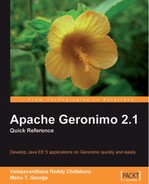Chapter 8. Naming and JNDI
The Java Naming and Directory Interface (JNDI) is a technology that is part of the Java platform that provides a unified and vendor-neutral interface to access different naming and directory services. The Java EE specification requires that the application servers that implement it should provide a naming service that implements the JNDI specification. This service will be used by the application server and the applications deployed in it to organize and look up resources and Java EE components. Apache Geronimo also provides a naming service that can be accessed by using the standard JNDI APIs. In this chapter, we will explore the naming service that Apache Geronimo provides and how it can be used for binding and looking up resources and components (both Java EE specific and the ones unique to Apache Geronimo).
A Java EE compliant application server is only required to provide the application or component local JNDI environment, but Geronimo also provides a global JNDI environment as a convenience for users of certain other application servers who implement this service. In this chapter, you will learn about the two types of JNDI naming contexts provided by Geronimo. These are:
Local JNDI context: An immutable component or application local context
Global JNDI context: A mutable server-wide (same VM) global JNDI context.
